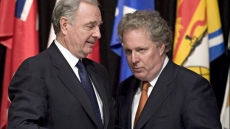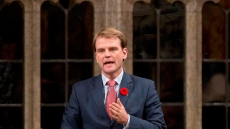OTTAWA — "The prime minister and the finance minister in the past week haven't been able to say the words 'income splitting' in this House. They are running from their own policy. They clearly don't want to draw attention to the fact that 85 per cent of Canadian households get absolutely nothing from this plan." — Liberal Leader Justin Trudeau in the House of Commons, Nov. 5.
___
Senior Liberals, including leader Justin Trudeau, say 85 per cent of Canadian households wouldn't see any benefits from the Conservative government's proposed income-splitting plan.
The long-promised measure, billed as the "Family Tax Cut," was unveiled last week by Prime Minister Stephen Harper as one element of a package of fiscal measures aimed at families with kids.
The government says more than 1.7 million families with children — some 43 per cent of all families with kids — would save on taxes under income splitting alone.
So is it true, as the Liberals claim, that 85 per cent of all Canadian households would not benefit from income splitting?
Spoiler alert: The Canadian Press Baloney Meter is a dispassionate examination of political statements culminating in a ranking of accuracy on a scale of "no baloney" to "full of baloney" (complete methodology below).
This one earns a rating of "no baloney" — the statement is completely accurate. Here's why.
THE FACTS
"Income splitting will not benefit 2.4 million two-parent families and it will not benefit any single-parent families," Trudeau said Wednesday during question period. "How can the minister pretend income splitting is all about families when he knows full well that the vast majority of parents will get absolutely nothing?"
Employment Minister Jason Kenney derided the question as "absolute rubbish" before defending the plan, which Ottawa estimates would cost public coffers about $2.4 billion in 2014-15 and roughly $2 billion per year until 2019-20.
"In fact, 1.7 million Canadian families with kids — that is nearly half of the families with kids under the age of 18 — will benefit from income splitting," Kenney said.
He continued: "100 per cent of families, that is four million, will benefit from the total tax package and benefit package announced by the prime minister last week."
That includes a measure to enrich the universal child-care benefit, which would be available to all families with children under 18. At the same time, the government did away with the child tax credit.
But in looking at income splitting on its own, what percentage of Canadian households would qualify for it?
WHAT THE EXPERTS SAY
First, let's look at estimates put forward by some of those who have scrutinized the income-splitting numbers.
The 85 per cent figure cited by the Liberals matches the one calculated by the C.D. Howe Institute in 2011, after the government announced its intentions but before details of the plan were released.
"In contrast to the families that would gain from splitting, 85 per cent of all households would gain nothing because they lack either a spouse (individuals and single parents) or a child under age 18," the institute said in a October 2011 report.
In a study released this week, that study's co-author crunched the numbers again, and came up with an even higher percentage.
Jonathan Rhys Kesselman, who authored the latest report for the Caledon Institute of Social Policy, found 87.1 per cent of all households would fail to gain anything from the plan. The two-per-cent difference was likely due to the fact the more-recent calculations used updated data, he explained.
Tax policy expert Jack Mintz of the University of Calgary has yet to run the numbers to determine what percentage of families would benefit from income splitting, but he said the 85-per-cent estimate could well be accurate.
However, Mintz said it's possible taxpayers could alter their lifestyles to take advantage of the changes: a spouse, for instance, could decide to quit work and stay home to raise the children.
"How many would get influenced by that?" Mintz said. "We don't know."
But Mintz, who has been publicly supportive of income splitting, said not all changes to tax policy have to reach a large segment of the population to be fair.
"Yes, maybe 15 per cent (of all households) might benefit, but the main point is that there were 15 per cent that have been discriminated against under the tax system," Mintz said.
"This is correcting for discrimination."
The Liberals say they calculated the 85-per-cent figure before the C.D. Howe report using data from Statistics Canada. Indeed, data from the 2011 National Household Survey actually produced a figure of 87.7 per cent, they said.
As for the government, Finance Department officials did not expand on where their 1.7-million-families figure came from, but it appears to be roughly in line with some of the Liberal calculations.
Statistics Canada says there are just over 4 million two-parent families in Canada. The glass-half-full government says 1.7 million, or almost 43 per cent, would benefit from income splitting, while the glass-half-empty Liberals say 2.4 million families — about 60 per cent — would not receive anything.
THE VERDICT
Trudeau's 85-per-cent figure is close to other estimates, including the party's own internal projection, of what percentage of Canadian households would benefit from income splitting.
The federal government, meanwhile, has not said the 85-per-cent figure is incorrect, but it hasn't expanded on how it came up with its numbers, either.
For these reasons, Trudeau's statement on income splitting contains "no baloney."
METHODOLOGY
The Baloney Meter is a project of The Canadian Press that examines the level of accuracy in statements made by politicians. Each claim is researched and assigned a rating based on the following scale:
No baloney — the statement is completely accurate
A little baloney — the statement is mostly accurate but more information is required
Some baloney — the statement is partly accurate but important details are missing
A lot of baloney — the statement is mostly inaccurate but contains elements of truth
Full of baloney — the statement is completely inaccurate





